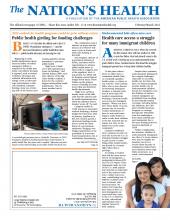
Photo by Monkeybusinessimages, courtesy iStockphoto
As a parent, you put a lot of time and energy into safeguarding your children’s health and well-being. You fret about their safety, grades, who they’re hanging out with and whether you’ve done all you can to steer them clear of drugs and alcohol. With so much to worry about, wouldn’t it be nice if there was something that could help ease some of your worries?
Fortunately, there is.
Research shows that taking part in team sports can have immediate and long-term benefits for kids. In addition to making lasting friendships and having fun, participating in sports can create a habit for physical activity. It can also lead to improved bone health and cardiovascular fitness, among other benefits.
And whether they’re playing soccer, softball, lacrosse, a game of pick-up basketball or something else, kids who play sports tend to get better grades, have higher levels of academic achievement and are more likely to graduate from high school.
Sports are also good for mental health. Science shows that kids who play sports have better self-esteem, are at lower risk for using drugs and alcohol, and have lower rates of anxiety, depression and suicide.
“You learn a little something about resiliency, perseverance, teamwork and how to manage success and failure,” says David Soma, MD, a pediatric sports medicine physician at Mayo Clinic in Rochester, Minnesota.
Playing sports teaches kids how to manage their time and balance priorities while also promoting important life skills such as self-control, leadership, empathy and respect. They learn what it means to play fair and be a good sport even when things don’t go their way.
“You can apply what you’ve learned from sports into your life,” Soma says. “All of the benefits of participating in sports, wrapped together, really are amazing.”
Keep sports fun and safe
Physicians recommend exposing children to a variety of different physical activities. Most kids are ready for organized sports at around age 6. Studies show that children who play different kinds of sports before they reach their tweens are less likely to lose interest.
“We shouldn’t push our kids into things they don’t enjoy or are not skilled at, but at the same time focusing on just one sport at an early age increases the risk of injuries because you’re repeating the same types of motions over and over again for many years,” Soma says. “It also poses the potential for burnout, which is not good.”
For those reasons, the American Academy of Pediatrics advises that children not specialize in one sport until about age 15. In fact, studies show that athletes who participated in a variety of sports, but didn’t specialize until later, were more likely to be successful than kids who specialized at an early age.
Keep in mind that your child’s body changes as they grow. Some kids may be tall for their age when young, but below average later, which can alter their success in a sport. And what they’re good at doing at age 6 might not be what they’re good at when they’re 16.
“Some kids may be faster or stronger or other things,” Soma says. “The more they diversify, the more opportunities for success. It also teaches them to move differently, use different muscle groups and learn different skills.”
If your child doesn’t enjoy participating in a sport, don’t force them to keep playing it, Soma advises.
“There is a lot of anxiety and nervousness in trying new things,” he says. “If they try soccer and don’t like it, then try something different.”
It takes a village. Or a mini-van
What should you do if you have more than one kid, and they’re all participating in sports on the same day at the same time?
Soma recommends teaming up with another family or enlisting the help of grandparents, aunts, uncles and friends to help get your children to games or pratice.
“And sometimes it means dividing and conquering, where one parent takes one child and the other parent takes another,” Soma says. “It does take a village when you have multiple children and a very busy life, but you have to commit and place it as a priority.”
Although it may take a chalkboard to keep track, all that hustling will pay off in the end for your kids, he says.
- Copyright The Nation’s Health, American Public Health Association









